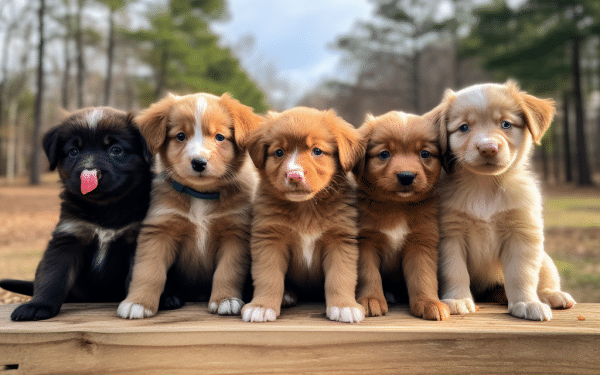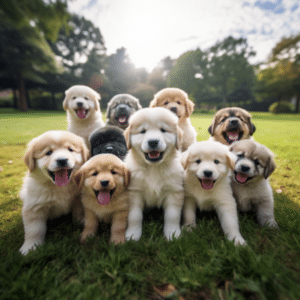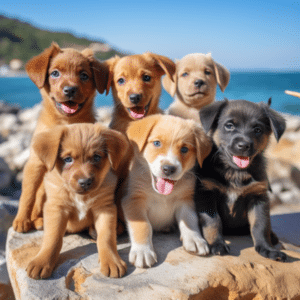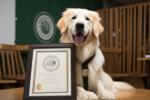Puppy Socialization: Building Confident Companions for Life

When it comes to raising a well-behaved and emotionally balanced puppy, socialization is key. Socializing puppies not only helps them develop into confident and adaptable companions but also plays a significant role in their overall well-being and behavior. The puppy socialization period, which usually occurs between 3 and 14 weeks of age, is crucial for exposing puppies to positive experiences that shape their future interactions with the world.
Positive experiences during this sensitive period lay the foundation for a puppy’s social skills, helping them navigate new environments, interact with different people and animals, and handle various stimuli. By providing positive experiences during socialization, we can prevent anxiety and stress-related behavioral problems in puppies, leading to a happier and healthier canine companion.
In the following sections, we will explore the importance of various socialization techniques, such as human interaction, training classes, playgroups, and controlled introductions to new environments. By incorporating these methods into your puppy’s early development, you can ensure they grow into a well-adjusted and sociable dog.

The Role of Socialization in Puppy Development
Puppy socialization plays a crucial role in their overall development and well-being. During the early stages of their lives, puppies go through a critical period where they are most receptive to new experiences. This period is known as the socialization window, and it typically occurs between 3 and 14 weeks of age. It is during this time that puppies form lasting impressions and learn to navigate the world around them.
Positive socialization experiences during this critical period have a significant impact on a puppy’s future behavior. Exposing puppies to a variety of people, animals, environments, and stimuli helps them develop confidence, adaptability, and social skills. It lays the foundation for a well-rounded and sociable adult dog.
It is important to note that socialization should be done in a positive and controlled manner. Negative experiences can have lasting effects on a puppy’s behavior and may cause fear or aggression later in life. By focusing on positive interactions and providing puppies with a safe and supportive environment, we can help them grow into confident and well-adjusted companions.
The Impact of Socialization on Puppy Behavior
Socialization has a profound impact on a puppy’s behavior. By exposing them to new experiences in a positive and controlled manner, we can shape their future responses to different stimuli. Puppies that have been properly socialized are more likely to be friendly, confident, and adaptable in various situations.
Through socialization, puppies learn how to interact with other dogs and humans, interpret body language, and communicate effectively. They become comfortable with different environments, sounds, and sights, reducing the likelihood of anxiety or fear-related behavioral problems later in life.
Positive socialization experiences also contribute to a puppy’s emotional well-being. Building trust and confidence through social interactions with humans helps puppies develop a strong bond with their owners and fosters a positive relationship based on trust and mutual understanding.
| Benefits of Socialization | Consequences of Lack of Socialization |
|---|---|
|
|
Building Trust and Confidence through Human Socialization
When it comes to socializing puppies, interactions with humans play a crucial role in building trust and confidence. Positive experiences with humans at an early age can help prevent fear or aggression towards unfamiliar faces later in life. It is essential to prioritize socialization with humans to ensure that puppies develop into emotionally balanced and well-adjusted companions.
During the critical socialization period, puppies are highly receptive to new experiences, making it the ideal time to introduce them to different people. By exposing puppies to a variety of individuals, such as family members, friends, and even strangers, we can help them become comfortable and confident in various social settings. This exposure helps them learn to trust humans and builds a foundation for positive interactions throughout their lives.
The Benefits of Positive Human Interactions
Positive interactions with humans are fundamental to a puppy’s emotional well-being. These interactions provide opportunities for puppies to learn appropriate social behavior, such as proper greetings, understanding personal space, and responding to cues. By engaging in positive experiences with humans, puppies learn to associate people with fun, love, and positive reinforcement.
“Socialization with humans is not just about introducing puppies to new faces; it’s about creating a bond based on trust, love, and mutual respect.”
By focusing on positive experiences, we can help puppies build confidence and shape their perception of the world around them. Whether it’s through gentle handling, playtime, or training sessions, every interaction with humans should be an opportunity for puppies to learn, grow, and feel safe.
| Benefits of Human Socialization for Puppies |
|---|
| Builds trust and confidence |
| Prevents fear and aggression towards humans |
| Promotes emotional well-being |
| Teaches appropriate social behavior |
| Strengthens the bond between puppy and owner |
Socialization with humans is not just about introducing puppies to new faces; it’s about creating a bond based on trust, love, and mutual respect. When puppies feel secure in their interactions with humans, they are more likely to approach new experiences with confidence and adaptability. Through positive human socialization, we can shape puppies into confident companions who bring joy and happiness to our lives.
The Importance of Preventing Anxiety and Stress-Related Behavioral Problems through Puppy Socialization
Socializing puppies is a crucial aspect of their development, as it helps prevent anxiety and stress-related behavioral problems in the future. Early socialization provides puppies with the necessary tools to navigate new experiences and environments with confidence. By exposing them to positive experiences, we can foster adaptability and create a solid foundation for their emotional well-being.
Table: Benefits of Preventing Anxiety and Stress-Related Behavioral Problems through Puppy Socialization
| Benefits | Description |
|---|---|
| Reduced anxiety | Socialization helps puppies feel more comfortable and less anxious in various situations. |
| Enhanced adaptability | Puppies who are well-socialized can adjust to new environments and experiences more easily. |
| Improved behavior | Proper socialization helps prevent fear-based aggression and other behavioral issues. |
In addition to reducing anxiety and preventing behavioral problems, socialization also plays a vital role in developing a puppy’s communication and social skills. When puppies are exposed to different stimuli, such as other dogs, humans, and various environments, they learn how to interpret body language, vocalizations, and play signals. This enables them to communicate effectively with other dogs and humans throughout their lives.
By creating positive associations with new experiences during socialization, we can shape puppies into confident and friendly companions. Positive experiences help build trust and confidence, making puppies less likely to associate unfamiliar situations with fear or stress. Through gradual exposure to new sights, sounds, and interactions, puppies can learn to approach new experiences with curiosity and a sense of security.
To ensure effective socialization, it is essential to provide puppies with a variety of experiences. This can include controlled introductions to new environments, attending training classes, participating in play groups and visits to dog parks, and engaging in leash walks. These experiences help puppies develop the necessary skills to navigate the world around them and build positive associations.
Effective Techniques for Socializing Puppies
In order to socialize puppies effectively, it is important to provide them with a variety of positive experiences and interactions. Here are some techniques that can help in the process:
- Training Classes: Enrolling your puppy in training classes not only helps develop obedience skills but also provides structured socialization opportunities. These classes allow puppies to interact with other dogs and people in a controlled environment, promoting proper behavior and social skills.
- Play Groups and Dog Parks: Joining play groups or visiting dog parks can be beneficial for socializing puppies. These settings offer controlled and supervised interactions with other dogs, allowing puppies to learn social cues, proper play behavior, and develop their social skills.
- Controlled Introductions to New Environments: Gradually introducing puppies to new environments is crucial for their socialization. This can be done by taking them to different locations with varying sights, sounds, and experiences. It helps them adjust and build positive associations with new stimuli.
- Leash Walks: Taking puppies on leash walks exposes them to different stimuli, interactions, and environments. It allows them to practice walking on a leash and encounter new situations, helping them develop confidence and social skills.
Remember, socializing puppies is an ongoing process, and it is important to provide positive experiences and interactions throughout their development. By utilizing these techniques, you can help your puppy become a confident and well-socialized companion.
“Socializing puppies is an ongoing process that requires positive experiences and interactions to help them become well-socialized companions.”
| Techniques | Benefits |
|---|---|
| Training Classes | Development of obedience skills and structured socialization opportunities |
| Play Groups and Dog Parks | Controlled and supervised interactions with other dogs, promoting social skills and proper play behavior |
| Controlled Introductions to New Environments | Gradual exposure to new sights, sounds, and experiences, allowing puppies to adjust and build positive associations |
| Leash Walks | Exposure to different stimuli, interactions, and environments, helping puppies develop confidence and social skills |
Training Classes for Socialization
Training classes provide structured socialization opportunities for puppies, helping them develop crucial skills for interacting with humans and other dogs. These classes offer a controlled environment where puppies can learn obedience commands and engage in positive interactions, building their confidence and social skills. Through positive reinforcement techniques, puppies are encouraged to associate training with fun and rewarding experiences, making the learning process enjoyable.
During training classes, puppies have the chance to interact with other puppies and learn appropriate play behavior. These interactions help them understand canine communication and body language, facilitating future social interactions. Additionally, training classes provide an opportunity for puppies to meet and interact with different people, helping them become comfortable around unfamiliar faces.
Trainers in these classes focus not only on obedience training but also on teaching puppies good manners and impulse control. This helps prevent behavioral problems, such as aggression or excessive barking, by reinforcing positive behaviors and redirecting unwanted behaviors. The structured nature of training classes allows puppies to develop self-control and tolerance for different situations, making them more adaptable and well-behaved companions in the long run.
| Benefits of Training Classes for Socializing Puppies | Benefits of Training Classes for Socializing Puppies |
|---|---|
| Structured environment for socialization | Opportunity to learn obedience commands |
| Positive reinforcement techniques | Interaction with other puppies for social skills development |
| Introduction to different people | Focus on manners and impulse control |
| Prevention of behavioral problems | Development of self-control and adaptability |
“Training classes provide a structured and positive environment for puppies to learn essential socialization skills. These classes not only teach obedience but also help puppies develop good manners and self-control. Through interaction with other puppies and exposure to different people, puppies build confidence and become well-rounded companions.”
Choosing the Right Training Class
When selecting a training class for socializing your puppy, it’s important to consider a few key factors. Look for a reputable trainer who uses positive reinforcement methods and has experience with puppy socialization. The size of the class should be manageable, allowing for individual attention and a safe environment for interactions. Additionally, check whether the class offers age-appropriate activities and focuses on building foundational skills for a well-behaved dog.
It’s also helpful to observe a class session before enrolling your puppy. This will give you a sense of the training techniques used, the overall atmosphere, and how the instructor interacts with both puppies and owners. A well-structured and positive training class can greatly contribute to your puppy’s socialization journey and set them up for a lifetime of confident and adaptable behavior.
The Role of Play Groups and Dog Parks in Puppy Socialization
Play groups and dog parks offer valuable opportunities for socializing puppies and promoting healthy interactions with other dogs. These environments provide controlled and supervised spaces where puppies can learn important social skills, develop confidence, and engage in appropriate play behavior.
One of the key benefits of play groups and dog parks is the exposure to a variety of dogs with different temperaments, sizes, and play styles. This helps puppies learn how to communicate effectively, interpret body language, and understand proper play signals. Through these interactions, puppies can develop their social skills, establishing boundaries, and practicing appropriate play behaviors.
Supervised playgroups or designated dog parks also provide a safe and controlled environment for puppies to interact, reducing the risk of negative experiences or confrontations. Trained professionals or experienced dog owners can facilitate positive interactions, intervene if needed, and ensure that play remains appropriate and enjoyable for all participating puppies.
“Play groups and dog parks provide a structured setting for socialization, allowing puppies to learn from one another and develop important social and behavioral skills. It’s essential to ensure that these environments are well-managed, promoting positive interactions and creating a safe space for your puppy to grow and learn.”
However, it’s important to note that not all dogs may be suitable for play groups or dog parks. Factors such as age, size, temperament, and health history should be considered when determining if these socialization settings are appropriate for your puppy. Additionally, always consult with your veterinarian or a professional trainer to assess your puppy’s readiness and ensure their safety in these environments.
| Benefits of Play Groups and Dog Parks for Puppy Socialization |
|---|
| Opportunity to socialize with a variety of dogs |
| Development of important social skills and understanding of play behavior |
| Supervised and controlled environment for safe interactions |
| Learning from other puppies and developing confidence |
Controlled Introductions to New Environments
Introducing puppies to new environments is an essential aspect of their socialization process. Controlled introductions allow them to gradually adapt to unfamiliar sights, sounds, and experiences, helping them build confidence and positive associations. By carefully managing these introductions, puppy owners can ensure that their furry friends feel safe and supported throughout the process.
One effective approach is to start with low-stress environments, such as a quiet park or a friend’s backyard, where the puppy can explore at their own pace. It’s important to take things slowly and avoid overwhelming the puppy with too much stimulation too soon. By observing their body language and behavior, owners can gauge their comfort level and adjust the pace accordingly.
New Environments
As the puppy becomes more comfortable in these controlled environments, gradually increase the level of stimulus. This can include introducing them to busier parks, bustling streets, or even different types of flooring surfaces. Each exposure should be accompanied by positive reinforcement, such as treats or praise, to help the puppy form positive associations with these new experiences.
| Benefits of Controlled Introductions to New Environments |
|---|
| 1. Builds confidence: Controlled introductions allow puppies to gradually acclimate to new environments, boosting their confidence and resilience. |
| 2. Prevents fear and anxiety: By carefully managing the introduction process, puppies are less likely to develop fear or anxiety towards new experiences. |
| 3. Promotes adaptability: Exposing puppies to various environments helps them develop adaptability, making it easier for them to adjust to new situations throughout their lives. |
| 4. Establishes positive associations: Pairing new experiences with positive reinforcement creates positive associations, making future encounters more enjoyable for the puppy. |
Controlled introductions to new environments aim to give puppies positive experiences for their socialization. With careful management and support, puppy owners can help their furry friends become confident and adaptable companions.
Leash Walks and Socializing Puppies
Leash walks are not only a means of exercise for your puppy but also an excellent opportunity for socialization. Taking your puppy on regular leash walks exposes them to various stimuli, interactions, and environments, which helps them develop confidence and social skills. It allows them to encounter different sights, sounds, and smells, preparing them for real-world experiences.
During leash walks, your puppy has the chance to meet other dogs, people, and even encounter different animals or objects. It is essential to create positive experiences during these encounters by using positive reinforcement techniques such as treats or praise. This positive association builds their confidence and helps them associate new experiences with something enjoyable.
H3: Benefits of Leash Walks for Puppy Socialization
Leash walks provide numerous benefits for puppy socialization:
- Exposure to different environments: Leash walks introduce your puppy to various environments, such as parks, sidewalks, or city streets. This exposure helps them become accustomed to different surfaces, noises, and distractions.
- Encourages proper behavior: Leash walks allow you to teach your puppy proper leash manners, such as walking calmly by your side and not pulling. This teaches them impulse control and how to respond to your commands.
- Opportunity for controlled interactions: Leash walks provide controlled interactions with other dogs, allowing your puppy to learn appropriate social behaviors and communication skills.
- Builds confidence: Regular leash walks in different settings build your puppy’s confidence, making them more adaptable and less likely to develop fear or anxiety-related behavioral issues.
Socialization Routine
By incorporating leash walks into your puppy’s socialization routine, you provide them with valuable experiences that contribute to their overall development and well-being. Remember to make each walk a positive and enjoyable experience, setting the foundation for a confident and socially well-adapted companion.
| Benefits of Leash Walks for Puppy Socialization |
|---|
| Exposure to different environments |
| Encourages proper behavior |
| Opportunity for controlled interactions |
| Builds confidence |
Interpreting Body Language, Vocalizations, and Play Signals
Puppy socialization plays a crucial role in helping them understand and communicate effectively with other dogs. One important aspect of socialization is teaching puppies to interpret body language, vocalizations, and play signals. By understanding these cues, puppies can engage in appropriate play behavior and avoid potential conflicts.
When it comes to body language, puppies need to learn to recognize both friendly and aggressive signals. Friendly signals include relaxed body postures, loose tail wagging, and play bows. On the other hand, aggressive signals may include raised hackles, stiff body postures, and a tense tail. By understanding these cues, puppies can respond appropriately and navigate social interactions confidently.
Vocalizations also play a role in communication between dogs. Puppies should learn to distinguish between different vocalizations, such as playful barks or growls and warning barks or growls. This understanding allows them to interpret the intentions of other dogs and respond accordingly.
“Interpreting body language, vocalizations, and play signals is a key skill for socialized puppies. It helps them develop positive relationships with other dogs and avoid potentially dangerous situations.” – Dr. Amanda Jones, Canine Behavior Specialist
Play signals are another important aspect of communication between puppies. Common play signals include the play bow, where a puppy lowers their front end while keeping their rear end in the air. Other signals may include gentle nipping, pouncing, and chasing. Understanding these signals enables puppies to engage in playful interactions and build strong social bonds with their peers.
In conclusion, teaching puppies to interpret body language, vocalizations, and play signals is an essential part of their socialization process. This skill allows them to communicate effectively with other dogs, engage in appropriate play behavior, and maintain positive relationships throughout their lives.
Creating Positive Associations with New Experiences
Fostering positive associations with new experiences is vital for socializing puppies. This builds confidence, reduces anxiety, and shapes their behavior positively when they encounter new environments, sights, sounds, and interactions.
To foster positive associations, gradually expose puppies to new stimuli in a controlled manner. Begin in a calm, quiet environment and slowly increase stimulation as the puppy becomes more at ease.
New Experiences
Positive reinforcement is also key in creating positive associations. Rewarding puppies with treats, praise, and affection when they encounter new experiences helps them associate those experiences with positive outcomes. For example, when a puppy meets a new person or another friendly dog, rewarding them for calm and friendly behavior reinforces the positive association with social interactions.
Creating positive associations with new experiences is a crucial aspect of socializing puppies. By providing them with positive experiences, we can help build their confidence, reduce anxiety, and shape their behavior in a positive way.
It’s important to remember that each puppy is unique, and what may be a positive experience for one may not be for another. Paying attention to the individual puppy’s reactions and adjusting the approach accordingly is essential. By taking the time to understand and cater to each puppy’s needs, we can ensure that they have the best possible socialization experience.
| Benefits of Creating Positive Associations | Examples |
|---|---|
| Builds confidence | Introducing a puppy to new people and rewarding friendly behavior |
| Reduces anxiety | Gradually exposing a puppy to new environments with increasing levels of stimulation |
| Promotes positive behavior | Rewarding a puppy for calm and friendly behavior during social interactions |
Overall, creating positive associations with new experiences plays a vital role in the socialization of puppies. It helps them develop into confident and well-adjusted companions who can navigate the world with ease and enjoy positive interactions with people and other animals. By prioritizing positive experiences, we can set our puppies up for a lifetime of happiness and social success.
Fostering a Lifelong Bond through Socialization
Socializing puppies is not just about building their confidence and preventing behavioral issues; it also plays a crucial role in fostering a lifelong bond between the dog and their owner. By engaging in positive socialization experiences, you can create shared memories and strengthen your relationship with your furry companion.
Positive experiences during socialization form the building blocks of trust, understanding, and mutual respect. Whether it’s introducing your puppy to new environments, people, or other animals, each positive encounter deepens the bond between you. These experiences help your puppy associate new situations with safety and comfort, enhancing their overall well-being and sense of security.
Lifelong Bond
A strong bond established through socialization also leads to better communication and cooperation between you and your puppy. As you expose your pup to various socialization techniques, you’ll develop a shared language that allows you to understand each other’s needs, desires, and boundaries. This heightened understanding strengthens the bond and makes your interactions more enjoyable and fulfilling.
Through socialization, you and your puppy will also learn to navigate challenging situations together, which further strengthens your bond. As you support and guide your pup through new experiences, you become a source of reassurance and stability. This shared journey builds trust and deepens the connection you have with your furry friend.
| Benefits of Socialization for Bonding |
|---|
| 1. Builds trust and understanding between you and your puppy |
| 2. Enhances communication and cooperation |
| 3. Strengthens the bond through shared positive experiences |
| 4. Navigating challenging situations together fosters trust and connection |
In summary, puppy socialization is crucial for their well-being and your bond. Positive social experiences build trust, communication, and lasting memories, strengthening your connection. Try various techniques, introduce new experiences, and see your relationship thrive.

Conclusion
Socializing puppies is a vital aspect of their development, contributing to their overall well-being and behavior. During the critical period of socialization, which typically occurs between 3 to 14 weeks of age, exposing puppies to positive experiences is crucial for shaping them into confident and adaptable companions. By engaging in socialization techniques, we can help our puppies develop trust, prevent anxiety and stress-related behavioral problems, and foster a lifelong bond.
Positive human socialization plays a significant role in building trust and confidence in puppies. By introducing them to various people and ensuring positive interactions, we can prevent fear or aggression towards unfamiliar faces. Furthermore, proper socialization with humans is essential for a puppy’s emotional well-being, encouraging healthy social behaviors and preventing potential behavioral issues in the future.
Effective techniques such as training classes, play groups, controlled introductions, and leash walks provide opportunities for puppies to experience different environments and interactions. These methods help them interpret body language, vocalizations, and play signals, enhancing their social skills and overall understanding. Additionally, controlled introductions to new environments and creating positive associations with new experiences contribute to a puppy’s confidence and friendly demeanor.
Overall, socializing puppies through positive experiences is a vital aspect of their upbringing. By understanding the role socialization plays in their development and implementing effective techniques, we can shape them into well-rounded, socially well-adapted companions. Investing time and effort into socializing puppies will lead to lifelong confidence, adaptability, and a strong bond between the dog and their owner.
FAQ
Why is socialization important for puppies?
Socialization plays a crucial role in shaping a dog’s behavior and overall well-being. It helps prevent future behavioral issues and fosters adaptability and confidence.
When is the best time to socialize a puppy?
The best time to socialize a puppy is between 3 and 16 weeks of age when they are highly receptive to new experiences.
How does socializing with humans benefit a dog?
Socializing with humans builds trust and confidence, preventing fear or aggression towards unfamiliar people and creating a friendly and socially-adept companion.
Can socialization prevent anxiety and stress-related behavioral problems in dogs?
Yes, proper socialization significantly impacts a dog’s emotional well-being, preventing anxiety or stress-related behavioral problems.
What are some effective techniques for socializing puppies?
Effective techniques for socializing puppies include training classes, play groups, dog parks, controlled introductions, and leash walks.
How do training classes help with socialization?
Training classes provide opportunities for puppies to interact with other dogs and learn essential skills and commands in a controlled environment.
How can play groups and dog parks help socialize puppies?
Play groups and dog parks allow puppies to engage in supervised play and interact with other dogs, helping them learn how to communicate and play appropriately.
What is the importance of controlled introductions to new environments?
Controlled introductions expose puppies to different environments, sounds, sights, and interactions, teaching them to adapt and remain calm in new situations.
How do leash walks contribute to socializing puppies?
Leash walks provide opportunities for puppies to encounter various stimuli, interact with different people, and practice good leash manners, enhancing their social skills.
Why is it important for puppies to interpret body language, vocalizations, and play signals?
Understanding these communication cues helps puppies interact appropriately with other dogs, preventing misunderstandings and potential conflicts.
How can positive associations be created with new experiences?
Positive associations can be created by associating new experiences with rewards, praise, and treats, fostering a confident and positive outlook on unfamiliar situations.
Does socialization contribute to a lifelong bond between dogs and their owners?
Yes, socialization helps foster a lifelong bond by building trust, understanding, and a positive relationship between dogs and their owners.






